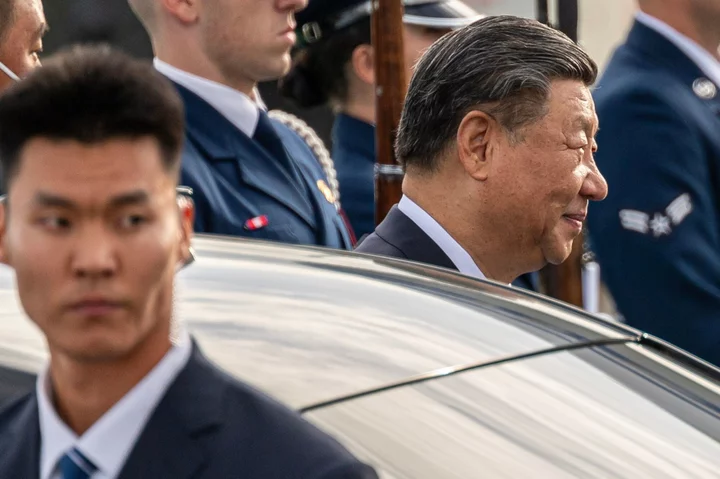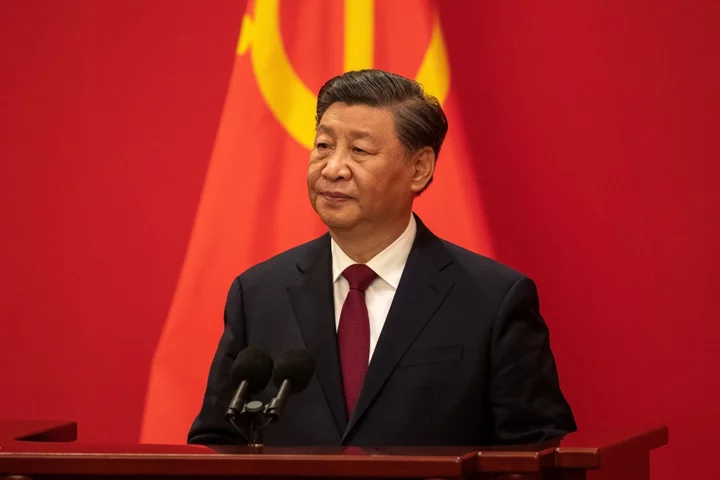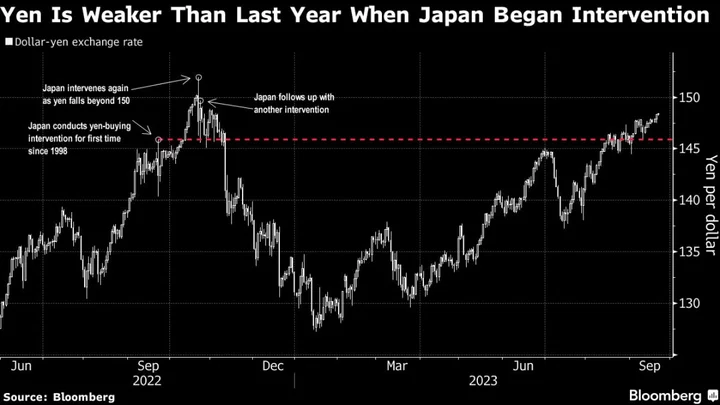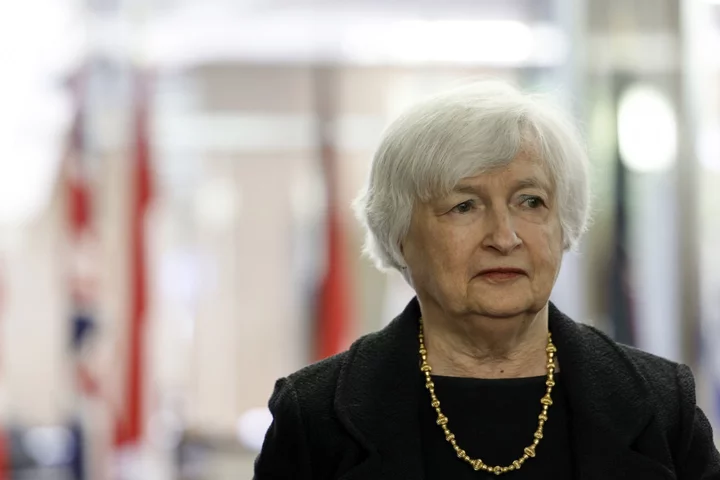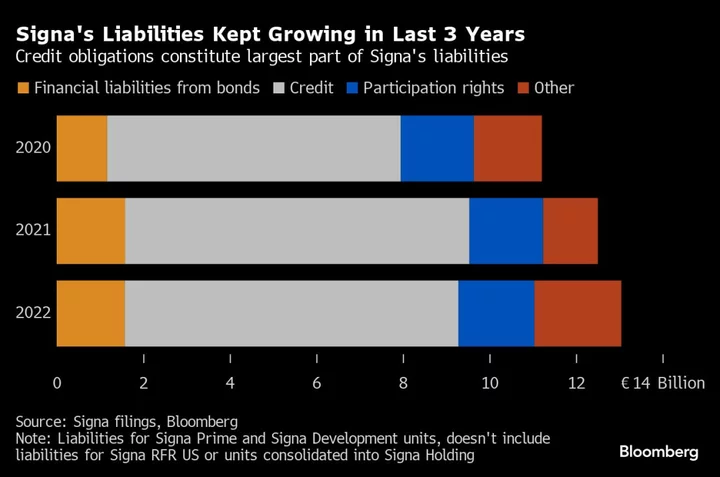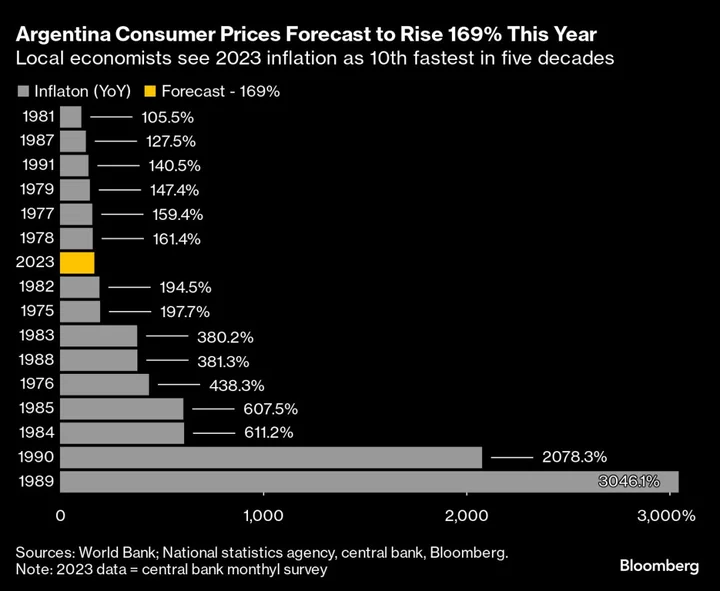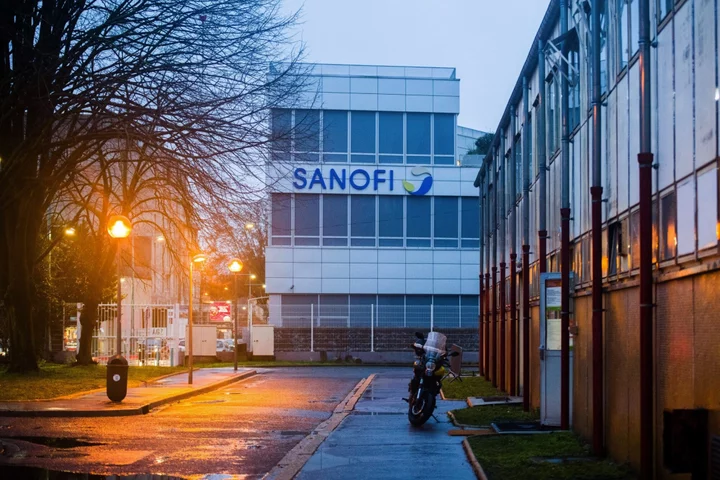Chinese President Xi Jinping is set to finish his first visit to the US in six years on a high note, in a week that’s seen a raft of rare good news for Beijing on everything from the economy to Taiwan.
Xi will be leaving San Francisco after a broadly positive trip that saw him agree with US President Joe Biden to better manage tensions and reassure Americans that China wants friendship, not war. That could reduce the risk of a crisis that raises military tensions at a time when Xi is struggling with a major property-market slump and a shakeup in senior leadership positions.
Xi’s agenda at the Asia-Pacific Economic Cooperation forum also featured a warm welcome from some of the most important US business leaders — offering the world a valuable reminder of his nation’s economic clout in the face of a pronounced drop-off in foreign investment. Xi on Thursday said more “heart-warming” measures were coming to make China more attractive to companies.
Back at home, fresh data suggested the economy may be putting some of its recent difficulties behind. And — perhaps most uplifting for Xi and his lieutenants — a new political alignment in Taiwan this week boosted the chances that a China-friendly leader will take power in a January election, ending the rule of a pro-independence party.
“There’s a few pieces of good news for Xi, first of all the Xi-Biden meeting,” said Dongshu Liu, assistant professor specializing in Chinese politics at the City University of Hong Kong. “For Xi, he needs this kind of success to both signal China’s willingness to be open to the international community of investors and to stabilize his domestic situation.”
It’s by no means a radical turnaround: The US took no step toward lifting tariff hikes or export controls, for example — and there’s no guarantee the week’s glow will last. Previous detentes have quickly been derailed, and Biden’s off-the-cuff remark again calling Xi a “dictator” showed the entrenched divisions that could again upend relations.
But for a Chinese leader grappling with enduring corruption concerns at the highest levels, a stiffening security posture in regional neighbors and faltering domestic confidence in his economy, it clocks up to a positive stretch.
A gauge of Chinese stocks listed in Hong Kong is on track to cap its best week in a month. The Hang Seng China Enterprises Index gained about 1.7% this week as of 10 a.m. on Friday, after worries over US chip probe erased earlier optimism about easing geopolitical tensions.
“The agreements emerging from the Xi-Biden APEC dialogue are meaningfully more than what markets expected,” said David Chao, a strategist at Invesco Asset Management. “It’s clear that guardrails have been placed on the world’s most important bilateral relationship — which I think puts a floor on political risk premium to Greater China risk assets.”
Read More: Fink, Schwarzman Get Coveted Seats at Xi’s Dinner Table in US
Shortly after his hours-long session with Biden Wednesday, Xi mounted a charm offensive of business executives in San Francisco.
Xi stressed to the group, which included the chief executive officers of giants such as Apple Inc., BlackRock Inc., Boeing Co. and Pfizer Inc., that China won’t fight a war with anyone and has no aim to challenge the US. Deepening US-China tensions in recent years have forced board rooms across the globe to reconsider how they think about supply chains that were originally set up only on the basis of cost efficiency.
Evoking the 1970s period, when US-China rapprochement focused on feel-good exchanges such as ping-pong diplomacy, Xi also appealed to Americans’ fondness for pandas. Before his remarks this week, China’s loaning of the iconic animals to US zoos appeared to come to an end.
“I was told that many American people — especially children — were really reluctant to say goodbye to the pandas and went to the zoo to see them off,” Xi said.
Read More: DC Zoo Spends $1.7 Million Hoping for Future Pandas From China
More substantively, Xi and Biden hashed out a handful of deals to try to address the fentanyl crisis, restore high-level military communications and open a dialogue over artificial intelligence. Biden hailed the talks as “some of the most constructive and productive discussions we’ve had.”
In another good sign for Xi, Biden stuck closely to the script with respect to Taiwan, after he pledged repeatedly in public to defend the democratically run island if Beijing were to invade.
Despite the dictator remark, Biden wasn’t drawn on questions over Taiwan scenario planning, and instead simply reiterated the so-called one China policy after his meeting with Xi. US officials said they believed the Chinese leader indicated he wasn’t readying plans for a mass invasion of Taiwan.
In Taiwan itself, prospects increased this week that the current ruling party, which rejects China’s claim to sovereignty over the island, may lose its bid to retain the presidency in elections in January. The two main opposition parties agreed to team up, which could see a more Beijing-friendly government coming to power.
Better Data
Xi will return to China weeks before top leaders are expected to meet to set economic targets for the new year. The country at one point looked like it would miss the 2023 target for growth of about 5%, thanks largely to a property slump that’s seen sales, investment and valuations all decline.
Latest indicators suggest the expansion will surpass 5% for the year, however, as infrastructure investment plans kick in. Consumer spending and industrial activity expanded faster than expected in October. Even so, monthly credit data showed limited demand in the private sector to take on new loans, a sign of continuing confidence issues.
Read More: China’s Stimulus Runs Into Wall of Doubts in a Bearish Market
Today’s challenges may appear more manageable than those back in early summer, when a communication freeze meant even a visit to Beijing by US Secretary of State Antony Blinken seemed out of the question and worries about China slipping into Japan-style stagnation were rampant.
“The week has illustrated President Xi will shift focus on domestic economy after a successful visit to the US,” said Xing Zhaopeng, senior China strategist at Australia & New Zealand Banking Group. “Economic issues only took a backseat in the dialogue, but the important thing is the stabilization of China-US relationship.”
--With assistance from Fran Wang.

